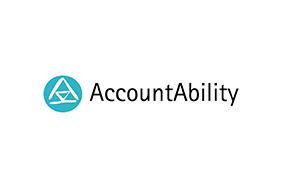Arab World Making Progress on Responsible Competitiveness, Major Opportunities Await Countries, Regions, Report Finds
Foreword by Her Majesty Queen Rania; AccountAbility Launches New Responsible Competitiveness Website
Published 05-18-09
Submitted by AccountAbility
WORLD ECONOMIC FORUM, DEAD SEA, JORDAN, May 18, 2009 - The Arab world is making progress towards responsible competitiveness, according to a new report released at the World Economic Forum on the Middle East, Responsible Competitiveness in the Arab World 2009.
The report was created by AccountAbility, the global, non-profit think tank, and Sustainability Excellence Arabia (SEA), the Jordan-based strategy consultancy, with support from the Arab Sustainability Leadership Group. Responsible Competitiveness in the Arab World is available for download in English and Arabic at www.responsiblecompetitiveness.org, a new, comprehensive resource dedicated to sharing information and insights about responsible competitiveness initiatives worldwide.
"Responsible competitiveness is about rewarding companies that address social, environmental and economic problems," said Her Majesty Queen Rania Al Abdullah Hashemite Kingdom of Jordan. "It is about nations prospering when they combine conscience with competitiveness. It is about making sustainable development count in global markets."
Responsible Competitiveness in the Arab World provides an assessment of regional performance for 15 Arab nations using a new customized benchmarking. The verdict? The region offers significant strengths even in the face of the global economic downturn, but major hurdles to responsible competitiveness remain. The Arab world has an average rank of 66th, out of 116 countries. The Organization for Economic Co-operation and Development (OECD) countries have an average rank of 23rd, while the Arab world is ahead of Eastern Europe and Central Asia, with a combined average rank of 71st.
The report also provides benchmarks for these individual Arab nations: Algeria, Bahrain, Egypt, Jordan, Kingdom of Saudi Arabia, Kuwait, Lebanon, Mauritania, Morocco, Oman, Qatar, Syria, Tunisia, United Arab Emirates and Yemen. [Please note: other Arab countries were not included for lack of data]. Within this systematic assessment of responsible competitiveness in the region, countries are encouraged to plan their own pathways to become more competitive globally, tackling their productivity challenges and building on their competitive advantages. The results demonstrate that responsible business practices are strongly positively correlated with competitiveness, human development and innovation.
The report also sets out a series of ambitious policy options for the region, with analysis and proposals from regional leaders including such as Abdulkareem Abu Alnasr, CEO of The National Commercial Bank, Helmy Abouleish, managing director of Sekem Group, Dr. Sultan Al Jaber, CEO of Masdar (a subsidiary of the Mubadala Development Company), Fadi Ghandour, CEO of Aramex, Rabea Ataya, CEO of Bayt.com, Randa S. Ayoubi, founder and CEO of Rubicon, and Frederic Sicre, executive director at Abraaj Capital.
"While this is a time of global economic crisis, it's also a time of opportunity for the Arab world," said Simon Zadek, CEO at AccountAbility. "The region is committing to responsible business practices and smart strategies to address the current economic challenges while being rooted in the principles of sustainable development. A responsible competitiveness lens should be applied to nearly every aspect of business development."
To transform existing and emerging challenges into profitable opportunities, the region can:
1. Make talent development a top priority - especially for youth. Current initiatives are effective but must be massively scaled up to meet the challenge.
2. Reduce the environmental impact by embedding a culture of energy efficiency and promoting renewable energy in workplace sustainability management and urban planning.
3. Promote a responsible business climate, ensuring consistent governance and regulation backed up by sustainable trade and investment strategies and incentives.
4. Become a global innovator by investing in key sectors, such as Islamic finance, water management and large-scale green infrastructure.
Across the Arab world, from wealthy economies like Dubai, Qatar and the Kingdom of Saudi Arabia, to middle-income nations like Tunisia and Jordan, to developing countries like Yemen and Mauritania, there are responsible competitiveness initiatives to celebrate and share. Saudi Arabia has created its ambitious "10x10" competitiveness strategy including its own responsible competitiveness initiative; Egypt implemented the first Arab-language code of corporate governance; and Jordan is building responsible competitiveness into the finance, tourism and construction/real estate sectors.
"We see real progress, but all of the Arab countries have room to grow-and opportunities to seize," said SEA president and AccountAbility Representative in the region, Darin Rovere. "Now our challenge is to scale-up these initiatives and create coherent national strategies that deliver sustainable development, long-term."
About AccountAbility
AccountAbility works to promote accountability innovations for sustainable development. It is a global, not-for-profit self-managed partnership founded in 1995, with bases in Beijing, Geneva, London, Sao Paulo and Washington D.C. and country representatives in Brazil, Canada, China, Jordan, Spain, Sweden and the US. It is a unique global network of leading business, public and civil institutions working to build and demonstrate the possibilities for tomorrow's global markets and governance through thought-leadership and advisory services. For more information please visit www.accountability21.net.
About Sustainability Excellence Arabia
Sustainability Excellence Arabia provides corporate responsibility services to businesses, governments and civil society in the Arab world. It works with many of the pioneering organisations adopting sustainability management in the region. It is also AccountAbility's lead regional partner, collaborating to deliver responsible competitiveness and related programs.
About the Arab Sustainability Leadership Group
The Arab Sustainability Leadership Group (ASLG) is a regional network of leaders of business, government, NGOs and civil society, launched May 2008 by Her Majesty Queen Rania Al Abdullah. The group aims to accelerate regional uptake of sustainability practices through leadership and advocacy, and to be a link between the Arab region and the rest of the world on key sustainability issues. Currently spanning five countries with 13 organizations, the group plans to expand to include all Arab countries in the near future.

AccountAbility
AccountAbility
AccountAbility is a global consulting and standards firm that works with businesses, investors, governments, and multi-lateral organizations to achieve opportunities, advance responsible business practices, and transform their long-term performance. We focus on delivering practical, effective, and enduring results that enable our clients to succeed.
More from AccountAbility

